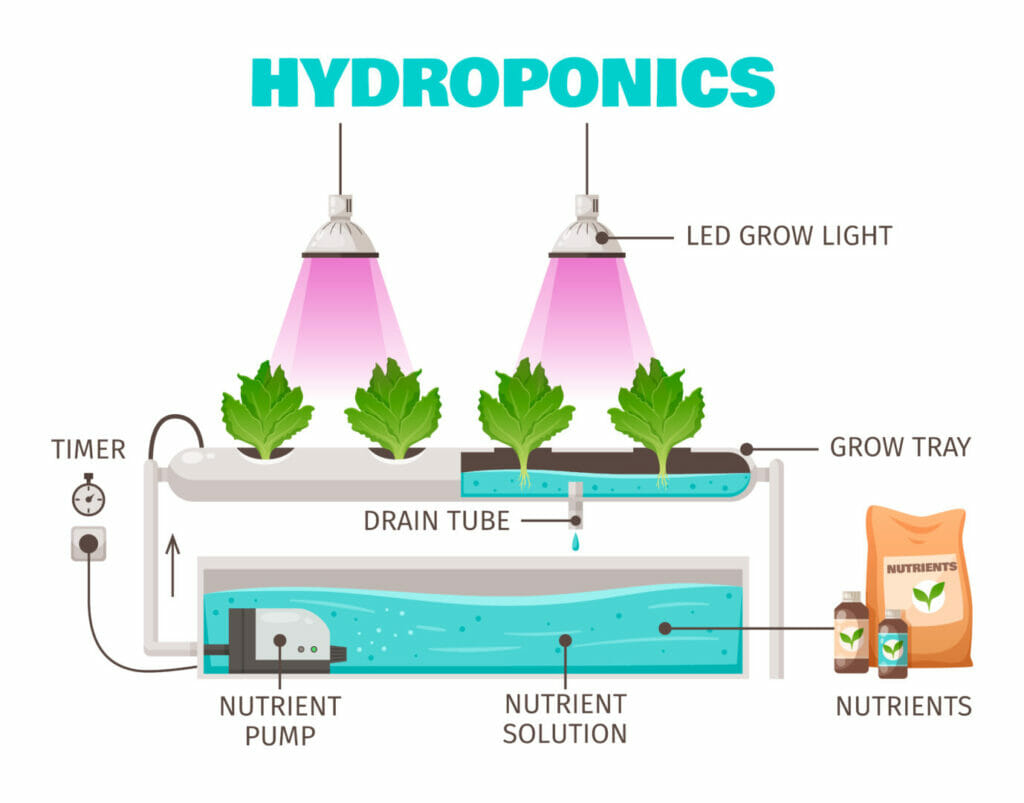The following report is by the Food Drive:
The court ruling allowing the USDA to grant organic certification to hydroponic crops will stand, the U.S. 9th Circuit Court of Appeals ruled on Thursday.
This latest decision is potentially the final chapter of the battle about whether organic crops must be planted in soil. The Center for Food Safety and other plaintiffs filed a lawsuit in 2020 following the USDA’s inaction on a petition urging the department to exclude hydroponically grown produce from organic certification.
The plaintiffs have argued for years that the 1990 Organic Foods Production Act, which established the organic program, mandates that its crops must “foster soil fertility.” Since hydroponic farming is done without soil, they have said it cannot meet the standards of the federal law and therefore crops grown that way should not be allowed to gain certification.
Last March, a federal judge upheld the USDA’s decision to allow hydroponic crops to be certified organic and dismissed the lawsuit. The judge ruled the USDA reasonably interpreted the law, which has no inherent prohibition for crops grown without soil. The plaintiffs appealed to the higher court.

The three-judge appellate panel agreed the text of the law does not expressly ban hydroponic crops from receiving organic certification. The USDA has a well-reasoned argument as to why hydroponic crops receive the certification, the opinion reads, so the court let the ruling stand.
The issue of whether hydroponic crops can be organic has been contentious since the organic program started. The National Organic Standards Board, which makes policy recommendations to the USDA, voted 8-to-7 against a ban on hydroponic certification in late 2017. The USDA followed those recommendations with new policy clarifications about hydroponic organic certification in early 2018.
Groups and individual farmers continued the fight with the petition and court case.
In an email, the Center for Food Safety said,
We are deeply disappointed by the Court’s decision, and are currently reviewing the decision and analyzing potential next steps.
In the years since this battle began, several large indoor farming operations have grown with an eye on disrupting the produce industry.
Indoor farming companies Upward Farms and Soli Organic both have received USDA Organic Certification for their crops, but neither of them uses hydroponics. Many companies in this space that do hydroponic growth are not currently organic certified, but say on their websites that their practices are more stringent than organic.
AUTHOR COMMENTARY
This move falls in line the rapid push to adopt vertical farming, which hydroponics will certainly parallel and congruently pair with the vertical processing the WEF and UN adore.
Vertical Farming Companies Create Manifesto To Establish Sustainable Food System
While it is true that there are certain crops that do just fine with only water – such as sprouts, which are cheap and healthy – this is more of man perverting his way and trying to outsmart God’s creation and natural design to things.
Here is what Nutritious Life has to say about hydroponics versus the traditional growing in soil:
As mentioned earlier, hydroponic vegetables tend to be similar to soil-grown in terms of nutrient content. Advocates say (and some tests have shown) that sometimes they are slightly higher in certain nutrients because growers can control exact inputs and because a lot of soil has been depleted by intensive production over the years, which strips out nutrients.
Of course, when soil is managed well, rich, organic dirt is incredibly nutrient-dense, and here’s one interesting thing: it contains billions of microorganisms, many of which are the basis of a healthy microbiome. That complex world of beneficial bugs isn’t even completely understood, yet, so in this case you may be missing out on something nature designed that we haven’t figured out yet, when you choose hydro.
There are also other, non-nutrient reasons to choose vegetables grown in soil, since dirt is kind of (actually, totally!) essential to life on the planet.
Dedicated organic farmers who are doing things right regenerate and maintain soil, and that soil literally pulls climate change-causing carbon out of the atmosphere and traps it beneath our feet (or zucchinis). They also do that using natural energy—sunlight—without tapping into the electrical grid.
The bottom line? We need smart, organic farmers to grow delicious veggies in rich, healthy soil, but having another option for winter (or just to produce more good food) is pretty exciting. My advice is to support local farmers who are taking care of the earth when you can and to also buy hydroponic veggies when they’re the freshest option available. To be honest, I want you eating a ton of vegetables, so there’s plenty of room on your plate for both.
Even if you are an atheist, agnostic, new ager, and so forth; surely you can see that the way crops grow the way they do, and the way nature, animals, and weather act as they do, for a certain symbiotic purpose and reason.
Thus, this author makes a good point in admitting that there are intrinsic differences when growing in the soil, that can never be replicated by doing it some other way.
Moreover, the push for hydroponics and vertical farming once again reveals one of the many ‘lies spoken in hypocrisy,’ by the same globalists who want people to not eat meat and eat bugs (1 Timothy 4:1-5). The sales pitch is to save the environment, but then want to create giant facilities that require an exuberant amount of utilities and dirty energy to produce!
[8] For my thoughts are not your thoughts, neither are your ways my ways, saith the LORD. [9] For as the heavens are higher than the earth, so are my ways higher than your ways, and my thoughts than your thoughts. [10] For as the rain cometh down, and the snow from heaven, and returneth not thither, but watereth the earth, and maketh it bring forth and bud, that it may give seed to the sower, and bread to the eater: [11] So shall my word be that goeth forth out of my mouth: it shall not return unto me void, but it shall accomplish that which I please, and it shall prosper in the thing whereto I sent it.Isaiah 55:8-11
[7] Who goeth a warfare any time at his own charges? who planteth a vineyard, and eateth not of the fruit thereof? or who feedeth a flock, and eateth not of the milk of the flock? [8] Say I these things as a man? or saith not the law the same also? [9] For it is written in the law of Moses, Thou shalt not muzzle the mouth of the ox that treadeth out the corn. Doth God take care for oxen? [10] Or saith he it altogether for our sakes? For our sakes, no doubt, this is written: that he that ploweth should plow in hope; and that he that thresheth in hope should be partaker of his hope. (1 Corinthians 9:7-10).
The WinePress needs your support! If God has laid it on your heart to want to contribute, please prayerfully consider donating to this ministry. If you cannot gift a monetary donation, then please donate your fervent prayers to keep this ministry going! Thank you and may God bless you.







